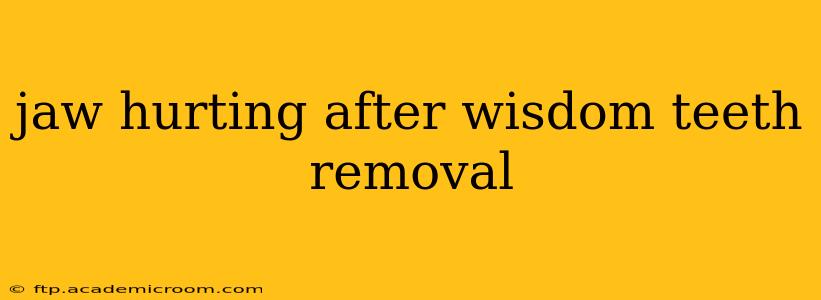Jaw Hurting After Wisdom Teeth Removal: A Comprehensive Guide
Having your wisdom teeth removed is a common procedure, but the recovery process can be challenging. Many patients experience jaw pain afterward, and understanding why this happens and how to manage it is crucial for a smooth recovery. This comprehensive guide addresses common concerns and provides valuable information to help you navigate this phase.
Why Does My Jaw Hurt After Wisdom Teeth Removal?
Jaw pain after wisdom teeth removal is a completely normal part of the healing process. The surgery itself involves significant trauma to the jawbone and surrounding tissues. The incisions, the removal of teeth, and the potential for stitches all contribute to discomfort and inflammation. The pain can range from mild soreness to significant throbbing, often accompanied by swelling and stiffness.
How Long Will My Jaw Hurt?
The duration of jaw pain varies considerably depending on individual factors like the complexity of the surgery, the patient's overall health, and how well they follow post-operative instructions. Generally, the most intense pain is felt in the first few days after the procedure. Over the next week or two, the pain should gradually subside. However, some lingering soreness might persist for several weeks. If the pain is severe, persistent, or worsening, it's vital to contact your oral surgeon immediately.
What Can I Do to Relieve Jaw Pain After Wisdom Teeth Removal?
Managing post-operative jaw pain is key to a comfortable recovery. Here's a breakdown of effective strategies:
-
Medication: Your oral surgeon will likely prescribe pain relievers, such as ibuprofen or stronger prescription medications, to manage the pain. Follow the prescribed dosage carefully.
-
Ice Packs: Applying ice packs to your cheeks and jawline can significantly reduce swelling and pain, especially in the first 24-48 hours. Use ice packs for 15-20 minutes at a time, several times a day.
-
Soft Foods: Stick to a soft food diet for at least the first week, avoiding anything that requires excessive chewing. This reduces strain on your jaw and allows the extraction sites to heal. Think soups, smoothies, yogurt, applesauce, and mashed potatoes.
-
Rest: Adequate rest is crucial for healing. Avoid strenuous activities that could increase pain and swelling.
-
Gentle Rinsing: After 24 hours, your oral surgeon may recommend gentle rinsing with salt water to keep the extraction sites clean and prevent infection. Avoid vigorous rinsing or swishing.
Is Jaw Pain After Wisdom Teeth Removal a Sign of Infection?
While some jaw pain is normal, severe pain, increasing swelling, redness, or fever could indicate an infection. Other potential signs include pus or a foul odor emanating from the extraction sites. If you notice any of these symptoms, contact your oral surgeon immediately. Early intervention is vital to prevent complications.
How Can I Prevent Jaw Pain After Wisdom Teeth Removal?
While you can't entirely prevent jaw pain, you can take steps to minimize it:
-
Follow Post-Operative Instructions: Adhering strictly to your oral surgeon's instructions is paramount. This includes medication, diet, and hygiene recommendations.
-
Proper Anesthesia: Ensuring adequate anesthesia during the procedure can significantly reduce post-operative pain.
-
Choose an Experienced Surgeon: Selecting a skilled and experienced oral surgeon can significantly impact the success and comfort of your procedure.
When Should I Call My Oral Surgeon?
Contact your oral surgeon immediately if you experience:
- Severe, persistent pain that doesn't respond to medication
- Increasing swelling or redness
- High fever
- Pus or a foul odor from the extraction sites
- Difficulty breathing or swallowing
- Excessive bleeding
Remember, every patient's experience is unique. This information is for general guidance only and doesn't replace professional medical advice. Always consult your oral surgeon for personalized care and instructions.
